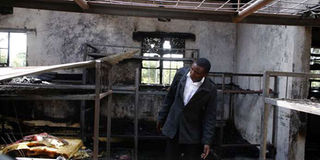Teachers blame school chaos on calendar changes

A staff looks at the extent of damage caused after a dormitory in PCEA Kambala Secondary School, Molo in Nakuru, was burnt on June 8, 2016. Knut Secretary-General Wilson Sossion has called for a review of school calender to stem protests and prevent further destruction of school property. PHOTO | SULEIMAN MBATIAH | NATION MEDIA GROUP
What you need to know:
- Some of the schools that have witnessed student unrest and burning of dormitories in the last two weeks are Longisa high school, Londiani high and Kabianga High in Kericho.
- He also shortened the period for the Kenya Certificate of Secondary Education exams from six weeks to four and put headteachers directly in charge of the tests in their respective schools.
Teachers on Sunday attributed the recent wave of unrest and destruction of property in schools to students’ anger over the extension of the second term.
The students were protesting against the long term and the shortened holiday, the Kenya National Union of Teachers Secretary-General Wilson Sossion said.
He argued it was unreasonable for the ministry of Education to keep students in school from May to late October with a break of only two weeks.
“The burning of schools is a reaction from students all over the country and ought to be addressed as a matter of urgency,” he said.
He also criticised the scrapping of mid-term breaks in the third term saying it was uncalled for since they were introduced to ease pressure on students to prevent unrest.
“To withdraw them is to open the doors for a wave of unrest,” Mr Sossion said in a letter to Education Cabinet Secretary Fred Matiang'i.
Some of the schools that have witnessed student unrest and burning of dormitories in the last two weeks are Longisa high school, Londiani high and Kabianga High in Kericho.
Others are Nyamache Boys Secondary School in Kisii, where three dormitories were extensively damaged, Machongo Pentecostal Assemblies of God Secondary School, St John’s Nyamagwa Boys High, St Mary’s Nyamagwa Girls High School (Kisii), Nambale High School (Busia) Bonyunyu Secondary School (Nyamira), Mukuyu Mixed Secondary School and Uriri High in Migori.
Mr Matiang’i last month reorganised the school calendar and made far-reaching changes in the administration of national examinations to curb cheating.
He also banned all social activities in the third term — including prayer days, visiting, half term breaks, sports, prize-giving ceremonies and annual general meetings — to cut contact between candidates and outsiders.
CURBING CHEATING
He also shortened the period for the Kenya Certificate of Secondary Education exams from six weeks to four and put headteachers directly in charge of the tests in their respective schools.
The exams are currently controlled by supervisors hired by the Kenyan National Examinations Council (Knec) from within the teaching fraternity.
To accommodate the changes, term two, which was initially scheduled to end on August 5, was extended to August 12, shortening the holidays to only two weeks from the previous four.
The third term will last only nine weeks from the previous 12, beginning on August 29 and ending on October 28.
In announcing the changes, Dr Matiang’i said the new guidelines would help curb cheating in national examinations by limiting contact between the candidates and outsiders.
The new guidelines were prompted by massive irregularities in last year’s national examinations, which saw the results of more than 5,000 candidates cancelled.
But Mr Sossion called for a review of the changes to stem the protests and prevent further destruction of school property.




